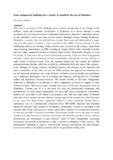Please use this identifier to cite or link to this item:
https://cris.library.msu.ac.zw//handle/11408/3229| Title: | Farm management challenges for a country in transition: the case of Zimbabwe | Authors: | Muziri, Tavagwisa | Keywords: | Farm management Tenure HIV/ AIDS Trade Education |
Issue Date: | 2009 | Publisher: | Journal of International Farm Management | Series/Report no.: | Journal of International Farm Management;Vol.4. No.4: 1-14 | Abstract: | This study is an analysis of the challenges posed on farm management by the changes in the political, social and economic environment in Zimbabwe as it moves through its land revolution era. An extensive review of literature buttressed by interviews with major players in the agriculture sector was done on the current challenges facing farming businesses. Zimbabwe, a country that was self sufficient in most food crops and which played a major role in world exports of tobacco, cotton and beef in the 1980s, is going through the most challenging times in its farming. Major reforms have occurred in the country's agriculture since attaining independence in 1980, resulting in a major shift in land ownership from the previous white commercial farmers to majority black farmers. Regrettably though, the issue of security of land tenure has not been conclusively resolved. Long-term farm management decisions, which form the bedrock of farm sustainability and growth, are now difficult to make owing to insecure tenure. Over the transition period also, the country has suffered general economic decline, which has resulted in a substantial fall in the value of the currency, acute shortages of foreign currency, spiralling inflation, and shortage of raw materials and basic commodities. At the other extreme, the AIDS epidemic has imposed an enormous cost on the farms and institutions due to the diversion of funds to pay for health care and funeral costs, employee absenteeism, cost of recruiting and replacing staff and the loss of healthy skilled and experienced human resources. The current scenario on the farm management landscape in Zimbabwe is an epitome of what is happening and likely to happen in other African countries. This review paper examines the causes of the farm management crisis in Zimbabwe. Coming out of it is the need for both the international community and governments to create equal opportunities for trade and ensure agricultural commodities markets are accessible to all without discrimination and with fair trade terms. Continued education of new farmers on more efficient management will be essential as well as the need to tap know how from former commercial farmers to move communal farmers from a subsistence way to a commercially orientated focus. HIV/AIDS education and treatment should be expanded and extended to all farming communities. Central to everything is the incentive that comes with security of tenure which allows farmers to own their land resources so that they are able to increase investment. Government should resolve the issue of tenure security over land resources to increase investment and stimulate growth on farms. African governments are encouraged to take seriously issues of farm management, encourage investment and growth in production as this is pivotal to attaining of food security. The international community is urged to work towards creating trade policies that raise incomes in rural economies in developing countries and level agricultural trading terms. | URI: | http://citeseerx.ist.psu.edu/viewdoc/download?doi=10.1.1.507.9043&rep=rep1&type=pdf https://www.researchgate.net/publication/233657781_Farm_Management_Challenges_for_a_Country_in_Transition_The_Case_of_Zimbabwe http://hdl.handle.net/11408/3229 |
ISSN: | 1816-2495 |
| Appears in Collections: | Research Papers |
Files in This Item:
| File | Description | Size | Format | |
|---|---|---|---|---|
| Farm management challenges for a country in transition.pdf | Abstract | 7.43 kB | Adobe PDF |  View/Open |
Page view(s)
182
checked on Feb 4, 2026
Download(s)
48
checked on Feb 4, 2026
Google ScholarTM
Check
Items in MSUIR are protected by copyright, with all rights reserved, unless otherwise indicated.



